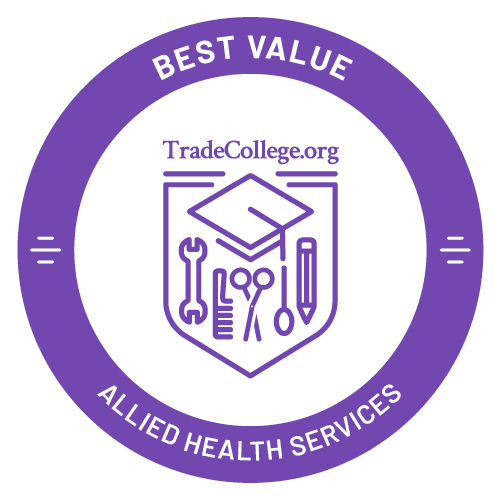Find Trade Colleges
2023 Best Value Allied Health Services Associate Degree Schools in Vermont
Identifying Quality Schools at More Affordable Prices
Finding the Best Allied Health & Medical Assisting Services Associate Degree School for You
Out of the majors we analyze each year, allied health & medical assisting services was ranked 7th in Vermont. In fact, 39 were awarded in the state in 2021-2022.
There are lots of options to pick from today when trying to decide which trade school program is right for you. You can choose a traditional brick and mortar school, or with the growth of online education, you can attend a school half-way across the country without even leaving your house.
To help you arm yourself with the information you need to make your decision, Trade College Search has developed this Best Value Allied Health Services Associate Degree Schools in Vermont ranking. This report analyzed 2 schools in Vermont to see which ones offered the best value associate degree programs for medical assisting students. The goal was to highlight schools with more affordable prices than others offering similar quality experiences.
When determining this ranking, we place a high emphasis on the school's quality as well as its sticker price. Even though a college may be affordable, it may not offer value. More specifically, we discount our quality score by the published tuition and fees charged by a school. This gives the cost per unit of quality for each college. The value is determined by how much quality your dollar buys.
Our calculations use out-of-state tuition and fees in our nationwide and regional rankings. Average in-state tuition and fees are used for our statewide rankings.
Featured schools near , edit
2023 Best Value Allied Health & Medical Assisting Services Associate Degree Schools in Vermont
Check out the medical assisting associate degree programs at these schools if you want to get the best value for your educational dollar.
Best Vermont Schools for Affordable Quality for an Associate in Allied Health Services
Our 2023 rankings named Community College of Vermont the best value school in Vermont for allied health & medical assisting services students working on their associate degree. Located in the rural area of Montpelier, CCV is a public school with a medium-sized student population.
The average tuition and fees for an in-state undergraduate at CCV are $6,920 a year. While working on their Associate Degree, medical assisting majors at CCV accumulate an average of around $15,951 in student debt.
Read full report on Allied Health & Medical Assisting Services at Community College of Vermont
A rank of #2 on this year’s list means Vermont Technical College is a great value for allied health & medical assisting services students working on their associate degree. Vermont Tech is a small public school located in the remote area of Randolph.
The average tuition and fees for an in-state undergraduate at Vermont Tech are $15,546 a year. The average amount in student loans that medical assisting majors at Vermont Tech take out while working on their Associate Degree is $19,202.
Vermont Tech not only placed well in our value ranking, but it is also #1 on our Best Allied Health Services Associate Degree Trade Schools in Vermont list.
Read full report on Allied Health & Medical Assisting Services at Vermont Technical College
Best Value Allied Health & Medical Assisting Services Colleges in the New England Region
Explore all the Best Value Allied Health & Medical Assisting Services Schools in the New England Area or other specific states within that region.
| State | Degrees Awarded |
|---|---|
| Massachusetts | 875 |
| Maine | 300 |
| Connecticut | 933 |
| Rhode Island | 236 |
| New Hampshire | 47 |
Majors Related to Medical Assisting
Allied Health & Medical Assisting Services is one of 11 different types of trade school programs to choose from.
Medical Assisting Focus Areas
Most Popular Related Majors
| Related Major | Annual Graduates |
|---|---|
| Health & Medical Administrative Services | 88,600 |
| Practical Nursing & Nursing Assistants | 85,339 |
| Allied Health Professions | 83,905 |
| Health Sciences & Services | 36,762 |
| Mental & Social Health Services | 30,331 |
Notes and References
*These averages are for the top 2 schools only.
- The Integrated Postsecondary Education Data System (IPEDS) from the National Center for Education Statistics (NCES), a branch of the U.S. Department of Education (DOE) serves as the core of the rest of our data about colleges.
- Some other college data, including much of the graduate earnings data, comes from the U.S. Department of Education’s (College Scorecard).
More about our data sources and methodologies.



